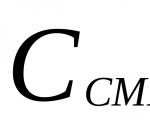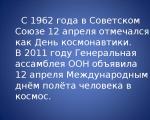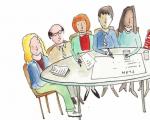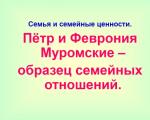Presentation on the topic "We remember." Presentation for an extracurricular event: “We remember, we are proud!” Why is the war called the Great Patriotic War?
1 slide
Completed by: Plotnikov Yuri Supervisor: Plotnikova N.I. Municipal secondary school in the village of Verkh - Chita, Chita district, Trans-Baikal Territory We remember!

2 slide
The war has passed, the suffering has passed, But pain calls out to people. Let's, people, never forget about this. (A. Tvardovsky)

3 slide
70 years have passed since the end of the Great Patriotic War. People who have seen the terrible face of war are leaving us. And we can only learn about those events from the stories of veterans, from books, feature films. The war touched every family with its cruel hand. And there was such a person in our family. This is my great-great-grandfather Gladkikh Ivan Petrovich.

4 slide
Gladkikh Ivan Petrovich was born in 1909 in the village of Kotelnikovo, Nerchinsk region. He worked as a laborer, got married before the war, and had four children.

5 slide
Forty-one! June. A year and a month of national struggle. Even with the dust of time this date cannot be delayed. The country rose and went to the front in droves, Kumach stars Carrying banners on the canvases.

6 slide
My grandfather, like thousands of other people, went to the front from the first days of the war. Wait for me and I will return. Just wait, Wait, when the yellow rains make you sad, Wait, when the snow is blowing, Wait, when it’s hot, Wait, when others are not welcome, Forgetting yesterday.

7 slide
On the website “Feat of the People” there is some information about the merits of my grandfather. Gladkikh Ivan Petrovich born 1909 Rank: Guards corporal in the Red Army from 07.1941 Place of conscription: Shilkinsky RVK, Chita region, Shilkinsky district Record number: 28327372 Archival documents about this award: I. Order (decree) on the award and accompanying documents to it - first page of the order or decree - line in the award list - award sheet II. Registration card file - data in the registration card file Medal "For Courage"

8 slide

Slide 9
My great-great-grandfather reached Berlin. Victory is at our door... How will we greet the welcome guest? Let women raise children higher, Saved from thousands of thousands of deaths, - This is how we will answer the long-awaited answer.

Slide 2
The war has passed, the suffering has passed, But the pain calls out to people. Let us, people, never forget about this. (A. Tvardovsky)
Slide 3
70 years have passed since the end of the Great Patriotic War. People who have seen the terrible face of war are leaving us. And we can only learn about those events from the stories of veterans, from books, feature films. The war touched every family with its cruel hand. And there was such a person in our family. This is my great-great-grandfather Gladkikh Ivan Petrovich.
Slide 4
Gladkikh Ivan Petrovich was born in 1909 in the village of Kotelnikovo, Nerchinsk region. He worked as a laborer, got married before the war, and had three children.
Slide 5
Forty-one! June. The year and month of the people's struggle. Even with the dust of times, this date cannot be delayed. The country was rising And the troops went to the front, Kumach stars On the canvases of banners.
Slide 6
My grandfather, like thousands of other people, went to the front from the first days of the war.
Wait for me and I will return. Just wait, Wait, when the yellow rains make you sad, Wait, when the snow is blowing, Wait, when it’s hot, Wait, when others are not welcome, Forgetting yesterday.
Slide 7
On the website “Feat of the People” there is some information about the merits of my grandfather.
Gladkikh Ivan Petrovich, born 1909. Rank: Guards. corporal in the Red Army from 07.1941 Place of conscription: Shilkinsky RVK, Chita region, Shilkinsky district Record number: 28327372 Archival documents about this award: I. Order (decree) on the award and accompanying documents to it - first page of the order or decree - line in the award list - award sheet II. Registration card file - data in the registration card file Medal "For Courage"
Slide 8
Archival documents.
Slide 9
My great-great-grandfather made it to Berlin.
Victory is at our door... How will we greet the welcome guest? Let women raise children higher, Saved from thousands of thousands of deaths, - This is how we will answer the long-awaited answer.
Slide 10
After the war, grandfather returned to his small homeland. He had two more children. My great-grandmother, daughter of Ivan Petrovich Stafeev (Gladkikh) Ulyana Ivanovna, born in 1935, recalled that my father did not talk much about the war, because the memories were too difficult. Grandfather was wounded in the war, so 13 years after the victory he died. I am proud that there was such a person in my family!
Tuba Rural Library, branch No. 35
Slide 2
The dead - To be constantly at their post, They live in the names of streets and in epics. The holy beauty of their deeds will be depicted by artists in paintings. To the living - to honor the Heroes, not to forget, To keep their names in immortal lists, To remind everyone of their courage And to lay flowers at the foot of the obelisks!

Slide 3
Children and war are two incompatible concepts.




Slide 4
War breaks and cripples the destinies of children. But the children lived and worked next to the adults, with their hard work they tried to bring victory closer... The children who survived that war need to bow to the ground! In the field, in occupation, in captivity, They held out, survived, they made it!


Slide 5: Young heroes
For military services during the Great Patriotic War, tens of thousands of children and pioneers were awarded orders and medals. Here are just a few of them. Young heroes

Slide 6: Marat Kazei
Marat Ivanovich Kazei was born on October 29, 1929 in the village of Stankovo, Dzerzhinsky district of Belarus. The Nazis burst into the village where Marat lived with his mother, Anna Alexandrovna Kazeya. Anna Aleksandrovna Kazei was captured for her connection with the partisans, and soon Marat learned that his mother had been hanged in Minsk. Together with his sister, Komsomol member Ada, the pioneer Marat Kazei went to join the partisans in the Stankovsky forest. He became a scout at the headquarters of a partisan brigade. Marat took part in battles and invariably showed courage and fearlessness; together with experienced demolition men, he mined the railway. Marat died in battle. He fought to the last bullet, and when he had only one grenade left, he let his enemies get closer and blew them up... and himself. For courage and bravery, pioneer Marat Kazei was awarded the title of Hero of the Soviet Union. A monument to the young hero was erected in the city of Minsk. Marat Kazei


Slide 7: Valya Kotik
He was born on February 11, 1930 in the village of Khmelevka, Shepetovsky district, Khmelnitsky region. Having taken a closer look at the boy, the communists entrusted Valya with being a liaison and intelligence officer in their underground organization. He learned the location of enemy posts and the order of changing the guard. When arrests began in the city, Valya, along with his mother and brother Victor, went to join the partisans. The pioneer, who had just turned fourteen years old, fought shoulder to shoulder with adults, liberating his native land. Valya Kotik was awarded the Order of the Patriotic War, 1st degree, and the medal “Partisan of the Patriotic War,” 2nd degree. Valya Kotik died as a hero, and the Motherland posthumously awarded him the title of Hero of the Soviet Union. Valya Kotik


Slide 8: Nadya Bogdanova
When she became a scout in the partisan detachment of “Uncle Vanya” Dyachkov, she was not yet ten years old. Small, thin, she, pretending to be a beggar, wandered among the Nazis, noticing everything, remembering everything, and brought the most valuable information to the detachment. The first time she was captured was when, together with Vanya Zvontsov, she hung out a red flag in enemy-occupied Vitebsk on November 7, 1941. They beat her with ramrods, tortured her, and when they brought her to the ditch to shoot her, she no longer had any strength left - she fell into the ditch, momentarily outstripping the bullet. Vanya died, and the partisans found Nadya alive in a ditch... She was captured for the second time at the end of 1943. And again torture. Considering the scout dead, the Nazis abandoned her. Its local residents came out. Only 15 years later she showed up, only then did the people who worked with her learn about what an amazing destiny of a person she, Nadya Bogdanova, was awarded with the Order of the Red Banner, the Order of the Patriotic War, 1st degree, and medals. Nadya Bogdanova


Slide 9: Great Patriotic War

10
Slide 10
The Great Patriotic War is one of the most terrible trials that befell the people. Its severity and bloodshed left a huge imprint on people's minds and had dire consequences for the lives of an entire generation.


11
Slide 11
4 years.1418 days. 34,000 hours. And 27,000,000 million dead compatriots. If a minute of silence is declared for each of the 27 million deaths in the country, the country will be silent for 43 years! 27 million. In 1418 days, this means 13 people died per minute.
12
Slide 12: Veterans of the Great Patriotic War of the villages of Tuba and Uska






13
Slide 13: Home Front Veterans






14
Slide 14








Soviet people was violated.
The Great Patriotic War began
For 4 long years until May 9, 1945, our grandfathers and great-grandfathers fought for the liberation of the Motherland from fascism.
The bloody war lasted for 1418 days.
More than 26 million people died.

Why is the war called the Great Patriotic War?
The Great Patriotic War is the largest war in human history.
The word "great" means very large, enormous, huge.
The war captured a huge part of the territory of our country, tens of millions of people took part in it.
It is called a Patriotic War because it is a fair war, aimed at protecting one’s Fatherland. Our entire huge country has risen to fight the enemy! Men and women, elderly people, even children participated in this terrible war.

Why did the war start?
Hitler decided to kill people only because they had a different nationality. Russians, Poles, Jews, French and other nations had to either accept and submit to the fascist regime of Germany, or die. In Germany itself there lived people of different nationalities; they were destroyed first. Many countries that were unable to resist Hitler for whatever reason surrendered. Germany attacked our country suddenly, early in the morning, when all the people were sleeping peacefully. But the Russians refused to submit to the Nazis, entered into an unequal battle with the Germans, and, thanks to courage and determination, won a victory over the enemy.
Ruler of Germany
Adolf Hitler

Great Patriotic War. The minister announced the war
Foreign Affairs Molotov Vyacheslav Mikhailovich.

All the people rose up to fight the enemy; everyone really wanted to drive the enemy out of their native land. All men who could hold weapons were called up to fight to defend their homeland. Fathers, older brothers went to the front, even many girls went to the front. Young people took off their school uniforms, put on overcoats and went to war straight from school, becoming fighters in the Red Army. Soldiers who served
in the Red Army, they were called Red Army soldiers.

HEROES - PIONEERS
Zina Portnova
Volodya Dubinin
Marat Kazei
The war brought difficult trials to children. Thousands of children showed heroism and courage. Many of them gave their lives for the Victory.
Lara Mikheenko
Arkady Kamanin
Vasily Kurka

Shura Kober
Vitya Khomenko
Nadya Bogdanova
Little heroes of the big war. They fought alongside their elders - fathers and brothers. And the young hearts did not waver for a moment!


Battle of Kursk
Siege of Leningrad
Battle for Moscow
Main battles
Battle of Berlin
Stalingrad
battle
Defense of Brest

Hero Cities is an honorary title awarded to 13 cities that became famous for their heroic defense during the Great Patriotic War of 1941-1945.
The highest degree of distinction - the title of "hero city" - is awarded to cities of the Soviet Union whose workers showed massive heroism and courage in defending the Motherland.


in Moscow on Red Square.
Marshal of the Soviet Union Georgy
Konstantinovich Zhukov receives
Victory Parade in Moscow
Soviet soldiers with defeated standards of Nazi troops.

Guards Katyusha mortars at the Victory Parade.
A column of paratroopers and submariners on Red Square.
General view of Red Square during the passage of troops on the day of the Victory Parade.







